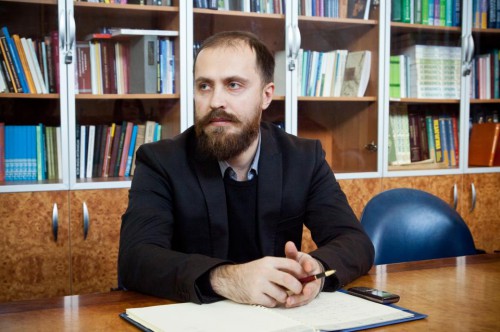mercredi, 02 octobre 2013
Myth, Utopia, & Pluriversal Realism

Myth, Utopia, & Pluriversal Realism
By Leonid Savin
Ex: http://www.counter-currents.com
Georges Sorel divided social and political formations into two types: (1) those which had a myth as the basis for their ideology, and (2) those which appealed to utopian ideas. The first category he attributed to revolutionary socialism, where the true revolutionary myths are not descriptions of phenomena, but the expression of human will. The second category is utopian projects, which he attributed to bourgeois society and capitalism.
In contrast to myth, with its irrational attitudes, utopia is a product of mental labor. According to Sorel, it is the work of theorists who are trying to create a model with which to critique existing society and to measure the good and evil within it. Utopia is a set of imaginary institutions, but also offers plenty of clear analogies to real institutions.
Myths urge us to fight, whereas utopia aims at reform. It is no accident that some utopians after gaining political experience often become adroit statesmen.
Myth cannot be refuted, since it is held in concert as a belief of the community and is thus irreducible. Utopias, however, can be considered and rejected.
As we know, the various forms of socialism, both on the left and right of the political spectrum were actually built on myths, as readily evidenced in their advocate’s works. It is sufficient to recall the Myth of the 20th Century by Alfred Rosenberg, who became an apologist for German National Socialism.
At the opposite end of socialism we also see a mythological basis, although it is analyzed post-facto. Even while Marx said that the proletariat does not need myths that are destroyed by capitalism, Igor Shafarevich conclusively demonstrated the link of the eschatological expectations of early Christianity and socialism. Liberation Theology in Latin America also confirms the strong presence of myth at work within left socialism of the 21st century.
If we talk in terms of the second and third political theories that have struggled with liberalism, it is pertinent to recall the remark of Friedrich von Hayek, who in his work The Road to Serfdom notes that, “in February 1941, Hitler felt it appropriate to say in a public speech that National Socialism and Marxism are basically the same thing.”
Of course, this does not diminish the importance of modern political myth, and also explains the hatred of it exhibited by the representatives of modern liberalism. Thus, political alternatives—whether the New Right, Indigenism, or Eurasianism—present a new totalitarian threat for neoliberals. Liberals, both classic and neo-, deny us our ideals, because they think they are largely mythological in character and thus cannot be translated into reality.
Now back to utopia. Liberal political economy, as rightly noted by Sorel, is, itself, one of the best examples of utopian thought. All human relationships are reduced to the form of free market exchange. This economic reductionism is presented by liberal utopians as a panacea for conflicts, misunderstandings, and all sorts of distortions that arise in societies.
The doctrine of utopianism emerged from the works of Tommaso Campanella, Francis Bacon, Thomas More, and Jonathan Swift, as well as philosophers-liberals such as the leader of the British radicals Jeremy Bentham. The embodiment of utopia was erected at first on a rigid regulatory policy, which, at the same time included violence as a form of coercion on its citizens. It then switched to colonial expansion, which allowed for the accumulation of capital and the establishment of a single so-called “civilized standard” for other countries. Then liberal utopianism went even farther, becoming, in the words of Bertram Gross, “friendly fascism,” in that it started to institutionalize dominance and hegemony through a regime of international law and regulations. By this time, liberal utopia has itself become a modern myth: technocentric, rational, and totalitarian—emasculating the first utopian idea of a just society and replacing it with materialism and utilitarian law, becoming, in effect, a dystopia.
In the case of both myth-centric societies, and utopias, consistently implemented through experiments with law, economics, philosophy, and politics, there was a major mistake in trying to extend the model globally. Fascism and Marxism fell first historically. However, liberalism has also now been called into question, as presciently noted about 20 years ago by John Lukacs in his work The End of the 20th Century and the End of the Modern Era.
Myth and utopia both drew their strength from the pluriversal world, homogenizing it and destroying its wealth of cultures and worldviews. The pluriversum was the basis on which the superstructure of Utopia was formed. It also where certain modern forces that aimed at implementing violent historical projects drew upon mythological deep mythological layers.
Within pluriversal reality there is space both for myth and utopia, if they are limited to a certain spaces with unique civilizational characteristics and separated from each other by geographical boundaries. Myth can be realized in the form of a theocracy or a futurological empire. Utopia could at the same time strive towards a biopolitical technopolis or a melting pot of the nations, but of course separately from myth-centric orders.
Carl Schmitt suggested the construction and recognition of such self-contained “Big Political Spaces” or Grossraume. The formation of these spaces would require a global program of pluriversalism, appealing to the distinctive myths and cultural foundations of different peoples. But all parties to a pluriversal order must have one thing in common as a prerequisite: the deconstruction of the superstructure of the nascent neoliberal utopia.
Article printed from Counter-Currents Publishing: http://www.counter-currents.com
URL to article: http://www.counter-currents.com/2013/09/myth-utopia-and-pluriversal-realism/
URLs in this post:
[1] Image: http://www.counter-currents.com/wp-content/uploads/2013/09/kris-kuksi-imminent-utopia-6-1.jpg
00:05 Publié dans Théorie politique | Lien permanent | Commentaires (0) | Tags : leonid savin, théorie politique, russie, sciences politiques, politologie |  |
|  del.icio.us |
del.icio.us |  |
|  Digg |
Digg | ![]() Facebook
Facebook



Les commentaires sont fermés.